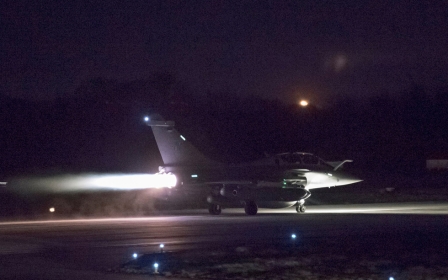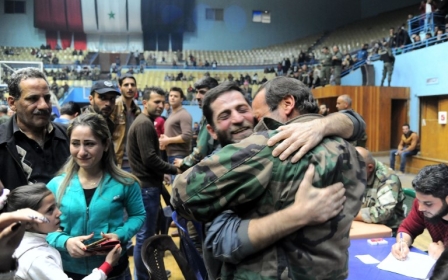Analysts back Trump stand on Syria, but fear escalation

WASHINGTON - Reactions to the Western strikes on Syrian chemical weapons sites came thick and fast late Saturday, with analysts praising a principled response to using poison gas on civilians, while others raised concerns over a flare-up with Russia and Iran.
They followed US President Donald Trump’s televised address to the nation in which he said the US, Britain and France had hit chemical weapons research and storage facilities in a series of strikes in Damascus and elsewhere overnight.
Jonathan Cristol, a scholar at the World Policy Institute, a think-tank, told Middle East Eye the strikes were a calibrated and ethical answer to Syrian President Bashar al-Assad’s use of banned weapons on civilians in Douma last week.
“The US has a strong interest in maintaining the norm against the use of chemical weapons. Assad agreed to eliminate them, he did not, and last year we struck in a symbolic strike. He has used them repeatedly over the last year, and now we have hit harder,” said Cristol.
“This makes sense to me, and if he uses them again we should hit even harder.”
Western strikes hit a Damascus research facility allegedly linked with chemical and biological weapons, and chemical weapons storage facilities and a command post near Homs, a city in western Syria, Pentagon officials said.
Hitting the regime is not going to change the regime, and this still falls short of what’s needed, which is a political transition to a democratic society.
-Imad Harb, the Arab Center Washington DC
The Britain-based Syrian Observatory for Human Rights, a monitoring group, said the targets included “scientific research centres, several military bases, and the bases of [Iran’s] Republican Guard and Fourth Division,” in and around Damascus.
Imad Harb, an analyst at the Arab Center Washington DC, a think-tank, said he supported the strikes but warned that they would do little beyond upholding global norms against the use of poison gas when much more was needed.
“The Assad regime should be punished for using chemical weapons against its people, but it should be punished for using all types of weapons against its people – and more Syrians die from conventional weapons than do from chemicals,” Harb told MEE.
“The Trump administration admitted that it’s a one-off attack. Hitting the regime is not going to change the regime, and this still falls short of what’s needed, which is a political transition to a democratic society, so the refugees can return home and Syria be stitched back together again.”
Western politicians and leaders issued statements shortly after Trump addressed the nation from the White House, often backing the action taken by the three governments in the face of Assad’s alleged repeated gas attacks.
Ed Royce, the Republican chairman of the House Foreign Affairs Committee, said the US was “justified to take limited action”, but warned against a solely military response and called for a switch to “strong diplomacy and serious financial pressure”.
Jens Stoltenberg, the secretary general of NATO, condemned Syria’s use of poison gas and backed the strikes, saying they would “reduce the regime's ability to further attack the people of Syria with chemical weapons”.
Still, Bernie Sanders, the leftist Vermont senator who sought the Democratic presidential nomination in 2016, said Trump had flouted Congress with “illegal and unauthorized strikes on Syria” that may not achieve their goal.
“After 17 years of war in Afghanistan and 15 years of war in Iraq, we need a political strategy to bring peace and stability to the region, not more US military intervention,” Sanders said in a statement emailed to MEE.
The coordinated strike marked the second time in a year that Trump has used force against Assad, who US officials claim has continued to test the West’s willingness to accept gruesome poison gas attacks on civilians.
It was an escalation in force compared with a US strike launched last year, when 59 cruise missiles were used against a single airfield.
The strikes had been expected since shocking footage surfaced of the aftermath of the attack in Douma, which prompted a furious reaction from Trump. His anger was quickly matched by France’s President Emmanuel Macron, who signed his country up for a joint response.
Britain's Prime Minister Theresa May had seemed more cautious, but by the time the first cruise missile was launched, Trump had assembled a mini-coalition.
Trump said the mandate for an allied attack was open-ended, but Defence Secretary Jim Mattis later said the strikes would be repeated only if Assad’s forces took further action that warranted a response.
The joint punitive operation came despite Russian threats to respond to an attack, with President Vladimir Putin’s administration repeatedly warning that Trump was taking America down a dangerous path.
After the strikes, Moscow’s ambassador to the US, Anatoly Antonov, warned of “consequences”.
General Joseph Dunford, Washington's top general, said Russia's forces in Syria had been warned through existing "deconfliction" channels that Western planes would be in Syrian air space, but that Washington had not revealed the target sites or timing in advance.
Unconfirmed reports that members of Iran’s Republican Guard had been hit added to fears that the Western strikes could lead to a broader confrontation with a nuclear-armed Russia or regional heavyweight Iran.
Cristol, however, said the chances of a military escalation remained low.
“I’m glad we used the deconfliction line with Russia and that Mattis was very clear that every effort is being made not to hit foreigners. We have no interest in attacking either the Iranians or Russians, and they have no interest in fighting us,” Cristol told MEE.
The episode is the latest example of hazards arising from a brutal Syrian conflict that has killed an estimated half-million people and drawn in world powers since it began as peaceful protests in 2011.
New MEE newsletter: Jerusalem Dispatch
Sign up to get the latest insights and analysis on Israel-Palestine, alongside Turkey Unpacked and other MEE newsletters
Middle East Eye delivers independent and unrivalled coverage and analysis of the Middle East, North Africa and beyond. To learn more about republishing this content and the associated fees, please fill out this form. More about MEE can be found here.




